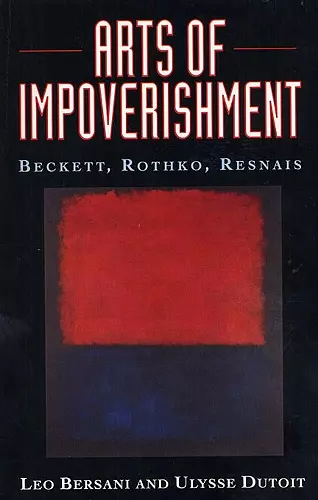Arts of Impoverishment
Beckett, Rothko, Resnais
Leo Bersani author Ulysse Dutoit author
Format:Paperback
Publisher:Harvard University Press
Published:31st Dec '93
Currently unavailable, our supplier has not provided us a restock date

Bersani and Dutoit are taking The Culture of Redemption into the territory of a positive aesthetics. This new book is an extremely important event, one that will be followed fervently be the admirers of their work. -- Rosalind Krauss
Taking three artists - Beckett, Rothko and Resnais, the book demonstrates that these artists train us in new modes of mobility, which differ from the moves of an appropriating consciousness.
“How almost true they sometimes almost ring!” Samuel Beckett’s character rues his words. “How wanting in inanity!” A person could almost understand them! Why taunt and flout us, as Beckett’s writing does? Why discourage us from seeing, as Mark Rothko’s paintings often can? Why immobilize and daze us, as Alain Resnais’s films sometimes will? Why, Leo Bersani and Ulysse Dutoit ask, would three acknowledged masters of their media make work deliberately opaque and inhospitable to an audience? This book shows us how such crippling moves may signal a profoundly original—and profoundly anti-modernist—renunciation of art’s authority.
Our culture, while paying little attention to art, puts great faith in its edifying and enlightening value. Yet Beckett’s threadbare plays Company and Worstward Ho, so insistent on their poverty of meaning; Rothko’s nearly monochromatic paintings in the Houston Chapel; Resnais’s intensely self-contained, self-referential films Night and Fog and Muriel all seem to say, “I have little to show you, little to tell you, nothing to teach you.” Bersani and Dutoit consider these works as acts of resistance; by inhibiting our movement toward them, they purposely frustrate our faith in art as a way of appropriating and ultimately mastering reality.
As this book demonstrates, these artists train us in new modes of mobility, which differ from the moves of an appropriating consciousness. As a form of cultural resistance, a rejection of a view of reality—both objects and human subjects—as simply there for the taking, this training may even give birth to a new kind of political power, one paradoxically consistent with the renunciation of authority. In its movement among these three artists, Arts of Impoverishment traces a new form of movement within art.
In Arts of Impoverishment, Leo Bersani and Ulysse Dutoit demonstrate how three artists—Beckett the writer, Rothko the painter, and Resnais the filmmaker—dare to fail, dare to turn away from ‘living’ and its consolations to confront the unliving, the uncreated, the unnamable. These artists do not just depict the void but void their very works of form and meaning, deconstructing their own media: Resnais by stalling movement, Rothko by blocking vision, and Beckett by obstructing any reading that attempts to save language from silence… Each of these artists, in different ways, bores holes into his own creation, unforming forms, unwording words, unmoving movies. Their works therefore resist what Bersani, in the title of his previous book, describes as ‘the culture of redemption’: a culture in which art is called upon to cure life’s ills, absolve its sins, correct its errors, and sublimate its passions… [Arts of Impoverishment] is one of the boldest critical statements of recent years. The book proposes no less than a redefinition of the work of art, at a time when critics, fearing charges of elitism, have become reluctant to distinguish works of art from any other form of cultural activity. The role of art, the authors argue, is not to comfort or redeem us or improve our politics, but to overwhelm us: to transport us to the limits of perception where being is created and dissolved… There is something so intoxicating about Bersani and Dutoit’s aesthetic of austerity that dearth begins to seem more sumptuous than plenty. The quest for impoverishment is perhaps the most heroic way to fail to fail. -- Maud Ellmann * Essays in Criticism *
This brilliant and thought-provoking interdisciplinary work by literary critic Leo Bersani and film scholar Ulysse Dutoit examines the frontiers between the work of art, whether literary, pictorial, or cinematographic, and the rest of the real world. * French Review *
Bersani and Dutoit are taking The Culture of Redemption into the territory of a positive aesthetics. This new book is an extremely important event, one that will be followed fervently be the admirers of their work. -- Rosalind Krauss
ISBN: 9780674048768
Dimensions: unknown
Weight: 290g
256 pages